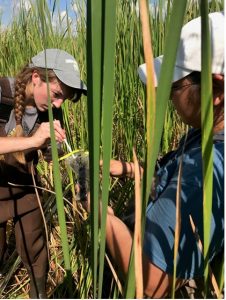Clarkson University Ph.D. student Evie Brahmstedt has been awarded the Theodore Gordon Flyfishers Founders Fund Scholarship. Brahmstedt, a graduate student in the Environmental Science & Engineering program of the University’s Institute for a Sustainable Environment was awarded the $3500 scholarship at the annual reception of the Theodore Gordon Flyfishers at the Union League Club in New York City on November 7th, where she discussed her current research studying mercury cycling in St. Lawrence River wetlands, and her future plans.

Theodore Gordon Flyfishers is a non-profit organization that promotes the conservation of fish and water quality through education, activism, and sustainable fishing practices, among other methods. Brahmstedt advocates that “…every water body, lake, river, stream, pond, wetland, is unique. Therefore, the conservation methods we take must match that system.” Brahmstedt has career plans supporting her goals in conservation, research, and education. She says, “I hope to find a career in academia where I can do research, but also teach and inspire students to become scientists and conservationists, as I was so inspired by my mentors throughout undergrad and into my graduate degree. I also plan to become involved with conservation efforts, such Theodore Gordon Flyfishers, to be involved at the public level, as well as seek involvement with government management organizations to make a change at the political level.”
Professor of Biology Michael Twiss and Brahmstedt’s thesis advisor says, “It is great to see non-profit organizations supporting student scholarships. It is particularly nice to see support for water-based research activity. Mercury in water affects wildlife and ultimately human health so understanding how this contaminant cycles in the natural environment is ultimately supportive of sustainable uses of our water resources.” Twiss’s research on mercury in the St. Lawrence River is conducted in collaboration with Thomas Holsen, Professor of Civil & Environmental Engineering at Clarkson University and Jeff Ridal of the River Institute in Cornwall, Ontario.